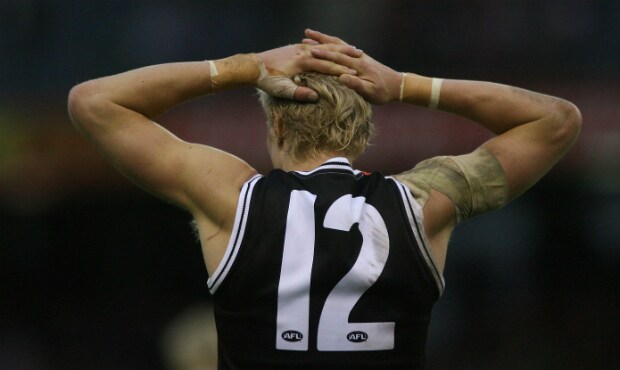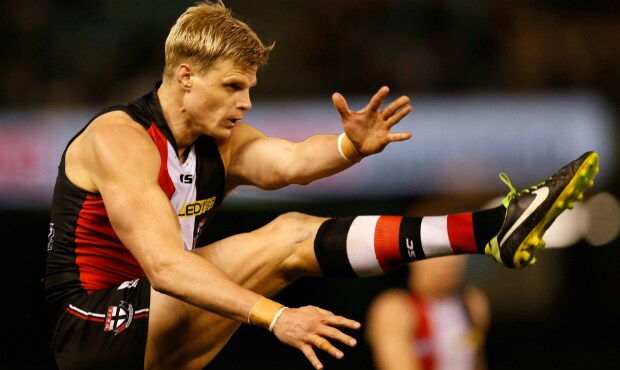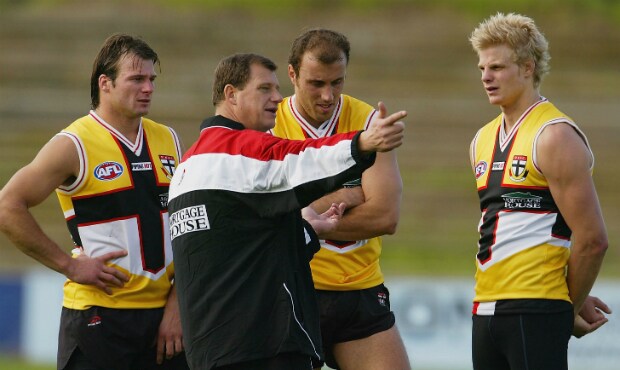When Grant Thomas first laid eyes on an 18-year-old Nick Riewoldt he couldn’t help but attach the stereotype to the person. He saw a tall, bright blonde haired, piercing blue eyed Queenslander who he thought looked like a great athlete, although someone who would look more at home in the surf at Burleigh Heads.
But he pondered whether or not the recently acquired No. 1 pick had heart, whether he was hard enough to make his mark at AFL level. Thomas was quickly reminded of the age-old adage of not judging a book by its cover. He wasn’t to know at the time, but he had just laid eyes on one of the best footballers to ever walk inside St Kilda Football Club.
“When I first saw him, I’ve got to be honest, when I saw a blonde haired, blue eyed surfer type from Queensland, I thought he’s probably got great skills but I wonder how hard he is?” Thomas told saints.com.au ahead of Nick Riewoldt’s 300th game against Western Bulldogs on Saturday night at Etihad Stadium.
“He looked very nice, very athletic and all the rest of it. But I remember thinking I couldn’t wait to see how he’d go in all the competitive stuff. He proved very early that one of his greatest attributes was his competitive streak and his willingness to succeed, so he put that theory to bed very early.”
When St Kilda parted ways with Malcolm Blight midway through 2001, Thomas was appointed caretaker coach for the remainder of the season, before assuming the responsibility on a full-time basis ahead of the 2002 season.
He held the role at the Saints until the end of 2006, boasting a winning coaching record, as well as being one of only three men to coach the club to three successive finals appearances, including two preliminary finals.
During his tenure at Moorabbin, Thomas and a young Riewoldt forged a special bond that has stood the test of time, with the current Saints skipper still picking his old masters brains, trying to fit the jigsaw pieces into the puzzle. And it’s that deep thirst for knowledge and continual search for self-improvement that Thomas attributes to Riewoldt’s glittering career in red, white and black.

“I think all the guys that have had something to do with ‘Rooey’ from a coaching point of view will say that he’s one of the more coachable people that you can have because he’s a complete sponge for information; he hangs on every word you say and he always wants to learn and get better,” Thomas said.
“What I’ve found is players fall into one of two categories: technicians or footballers. He was the complete package.
“He liked to understand the technical aspects of football and loved to learn about what’s required to be successful – mental toughness, mental application, being self-driven, being a pro’s pro – all those things were really important to him.
“When you have someone that wants to learn about the mental attitudinal aspects, as well as the technical aspects, then you have something special.”
Despite Riewoldt’s persistent battles with his ageing body, particularly in the last five years with his knee which has demanded daily attention to get up to play each week, the champion centre-half forward has continued to defy the lingering threat of retirement.
Thomas credits Riewoldt’s ability to go back to the well, time and time again, to a combination of a pride and a boyish immaturity that keeps him connected to the younger generation, many of whom weren’t even out of primary school when Thomas and Riewoldt first crossed paths.
“He’s just got a deep reserve of pride that just continues to drive him and push him to see how good he can possibly be. He’s incredibly driven, just incredibly driven,” Thomas said.
“I think whilst his body has aged a little bit, his athleticism has held him in very, very good stead to be able to run and continue to evolve. So that’s preserved his body a bit.
“Ironically, the other reason for his longevity I think is his connectedness to younger players because he’s quite strange, in some ways he’s very mature but in other ways he’s very immature.
“I think it’s that boyish type innocence and immaturity in some ways allows him to stay connected with the young guys and keeps him very young at mind. I think the mental grind as much as the physical grind wears players down and he’s not ground down mentally.”

Across the last two decades, professionalism in the AFL has undergone a complete transformation. No one has carried that torch more than Riewoldt who has led the way with his meticulous approach to preparation and recovery.
At a pre-season training camp in London, Thomas reminisced on a moment where two of Great Britain’s finest athletes, Daley Thompson and Colin Jackson, looked on with complete amazement as Riewoldt churned out 400m reps. The decorated pair were certain they were looking at a world-class athlete who could compete at Olympic level.
“I remember when we took the team to London for a three-week training camp, some of the great British athletes were there and they were stunned by Rooey,” Thomas said.
“Daley Thompson and Colin Jackson were watching the guys do their 400s and they both said: ‘Give me that big blonde haired guy and he’ll be representing Australia at the next Olympics. He’ll be a 400m or 800m runner every day of the week.’
“They were completely mesmerised by him and these were two of the greatest athletes Britain had produced. And they were unanimous that he was a world class Olympic athlete.”
Having progressed through a 15-year career in the evolving world of commercialisation in football and everything that goes with that, rival clubs have thrown the world at Riewoldt trying to prise him from St Kilda’s grasp.
Despite being inundated with extremely lucrative propositions across the journey, Thomas revealed Riewoldt’s unwavering loyalty comes down to how he was raised and how important it is for him to one day be able to explain to his son James that he was a one club player, someone who stayed true to his tribe.
“I suppose it really comes down to his upbringing. You look at Joe and Fiona – that’s got a hell of a lot to do with it. Family. I know that he wanted to talk to his son James about being a one club player, that sort of stuff is important to him,” Thomas said.
“At the end of the day I think ‘Rooey’s’ always been indebted to St Kilda for the time and effort put into him and I think there’s circumstances of getting fingernails on silverware and not quite delivering has played a role in that as well.
“I think he wants to get the job done or get St Kilda in a position to do it; he doesn’t want to be known as someone who walked out on a challenge. I think all those qualities have contributed.
“I’ve spoken to him on numerous occasions where he’s had significant interest and exuberant amounts of money offered to him, much more than he was on, and it didn’t faze him at all because he was a truly professional athlete that was after premierships and success, that was the most important thing.”

Book your ticket today to St Kilda's Hall of Fame & 1966 Premiership Anniversary Celebration


